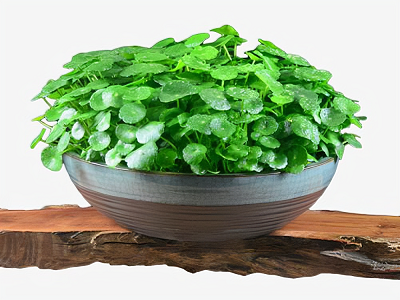Is Jin Qian Cao Really Effective in Treating Cystitis?
Many patients with the condition often search for or inquire about various folk remedies to expedite the healing of cystitis. These remedies are generally herbal, such as Di Fu Zi (Kochia scoparia) soup, Hua Shi Cao (Talcum) soup, and Jin Qian Cao (Lysimachia christinae), with the latter being one of them.

But is Jin Qian Cao really effective in treating cystitis? Let's delve into this:
Jin Qian Cao is a perennial herb with slender, creeping stems covered sparsely with rust-colored multicellular soft hairs. It roots at the nodes. The leaves are opposite, ovate to nearly round or reniform, 4-25mm in diameter, with a broad rounded or slightly indented apex and a broadly cordate base.
The leaves are slightly hairy on the surface and have short, appressed soft hairs on the back. They are entire, with long petioles shorter or nearly as long as the leaf blade. This plant prefers warmth and tolerates low temperatures but avoids high temperatures, thriving in temperatures ranging from 16-24°C.
Jin Qian Cao contains phenolic compounds, volatile oils, flavonoids, glycosides, amino acids, choline, tannins, potassium chloride, etc. Its taste and meridians are sweet, salty, and slightly cool, and it acts on the liver, gallbladder, kidney, and bladder meridians. It also has multiple functions, such as clearing heat, detoxifying, diuresis, and expelling stones. It can be used to treat cholecystitis, urinary tract stones, jaundice-type hepatitis, gallstones, traumatic injuries, poisonings from mushrooms and drugs, snake bites, purulent inflammations, and burns.
The integration of traditional Chinese and Western medicine can treat various diseases, including urinary tract infections, cholecystitis, nephritis, jaundice, malaria, leukorrhea, soft tissue injuries, eczema, epilepsy, tinea, and other diseases. Cystitis is a type of urinary system infection, so Jin Qian Cao can be chosen for treatment.
Here's a detailed method of treatment using Jin Qian Cao:
Take 30-120 grams of fresh Jin Qian Cao or 15-60 grams of dried Jin Qian Cao. Both dried and fresh Jin Qian Cao can be used for medicinal purposes. Add appropriate water, boil, strain the residue, and drink the liquid. Alternatively, the fresh Jin Qian Cao can be crushed, and its juice can be consumed directly.
However, Jin Qian Cao should not be used long-term. Prolonged consumption of Jin Qian Cao can damage the body's vital energy. Its effectiveness in treating kidney or gallbladder stones may significantly decrease with long-term use and even exacerbate the condition.
Not everyone is suitable for drinking Jin Qian Cao-infused water. In general, patients with a weak spleen or diarrhea should not consume Jin Qian Cao raw or as an infusion, as it may worsen their condition.
When purchasing Jin Qian Cao, buying from a reputable hospital is best. If choosing fresh Jin Qian Cao, opt for those with vibrant green color, intact leaves, and a faint fragrance, as these are of the best quality.
It's also important to note that Jin Qian Cao is naturally cooling. It's not recommended for long-term use by patients with a cold constitution, as it can harm the spleen and stomach. If you insist on using Jin Qian Cao, consider adding some dried ginger to mitigate its cooling effects on the body.
For those who wish to treat cystitis completely, it's better to choose comprehensive traditional Chinese medicine formulations. For instance, Diuretic and Anti-inflammatory Pill containing over 50 natural ingredients can be very effective. When combined appropriately, these herbs can clear heat, detoxify, activate blood circulation, and alleviate various discomforts. The effects are often significant and less likely to recur.
In summary, although Jin Qian Cao can alleviate cystitis, it is a single herb with limited efficacy. Cystitis is a complex condition, and the treatment with Jin Qian Cao can only play a supportive role, with limited effectiveness. Its function and efficacy are restricted.
Recommended Readings:
Why Does Cystitis "Target" You? See If You Meet These 4 Points
Chinese Herbal Remedies for Cystitis: Can Kochia Scoparia Cure the Disease?
Cystitis Still Not Improving After Taking Medication? What Should I Do?



